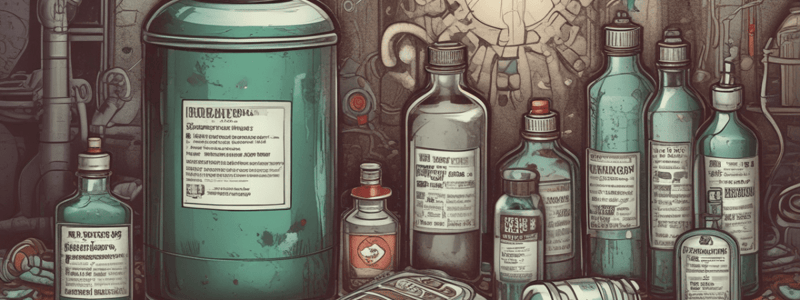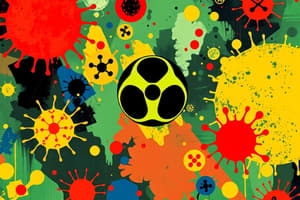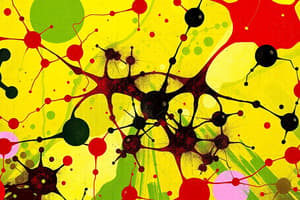Podcast
Questions and Answers
What is a poison?
What is a poison?
- Any substance that can cause harm or death regardless of how it enters the body or in what quantities (correct)
- A substance that can cause harm or death only when ingested
- A substance that has a physiological effect when given in the appropriate circumstances and dose
- A substance that can cause immediate damage but not death
What is the primary focus of the study of toxicology?
What is the primary focus of the study of toxicology?
- The study of household chemicals and their effects
- The study of toxins and poisonous substances (correct)
- The study of Drugs and their effects
- The study of intentional poisoning and overdose
What is a common route of poisoning?
What is a common route of poisoning?
- Inhalation
- Ingestion (correct)
- Injection
- Absorption
What is a sign of ingestion poisoning?
What is a sign of ingestion poisoning?
What is a resource for identifying and managing poisoning cases?
What is a resource for identifying and managing poisoning cases?
What can occur due to neglect or oversight?
What can occur due to neglect or oversight?
What is the purpose of using activated charcoal in managing poisoning by ingestion?
What is the purpose of using activated charcoal in managing poisoning by ingestion?
What is a common cause of poisoning by injection?
What is a common cause of poisoning by injection?
What is crucial in inhalation poisoning cases?
What is crucial in inhalation poisoning cases?
What is the primary goal when managing absorption poisoning?
What is the primary goal when managing absorption poisoning?
What is a common effect of poisoning by absorption?
What is a common effect of poisoning by absorption?
Flashcards are hidden until you start studying
Study Notes
-
As advanced EMTs, you will encounter patients who have taken drugs of abuse, including legal and illegal substances, which can be toxic in nature.
-
A poison is any substance that can cause harm or death, regardless of how it enters the body or in what quantities.
-
A drug is a substance that has a physiological effect when given in the appropriate circumstances and dose, but when taken in excess, it can cause an overdose, which is a toxicological emergency.
-
Toxicology is the study of toxic or poisonous substances, and some toxicological emergencies include intentional poisoning, medication dosing errors, and childhood poisonings.
-
Toxins can be found in nature, such as in wild mushrooms and berries, and can also be present in the workplace, resulting in exposure and potential harm.
-
Unintentional poisoning can occur due to neglect or oversight, and chemical or biological warfare can also result in intentional poisoning or overdose.
-
The American Association of Poison Control Centers provides a helpline and online resources for identifying and managing poisoning cases.
-
There are four primary methods of toxin entry into the body: ingestion, inhalation, injection, and absorption.
-
Ingestion is a common route of poisoning, often occurring through medications and household chemicals, and can cause immediate damage or delayed effects.
-
Signs of ingestion poisoning include partially chewed leaves or missing berries, stained fingers, lips, or tongue, and empty pill bottles.
-
Managing poisoning by ingestion involves removing or neutralizing the toxin before it enters the intestines, and activated charcoal may be used as an alternative treatment.
-
Inhalation poisoning can occur through home medications and household chemical products, and can cause rapid onset of signs and symptoms.
-
Scene safety is crucial in inhalation poisoning cases, and patients may need to be decontaminated before receiving emergency care.
-
Poisoning by injection is often the result of drug abuse, and signs and symptoms can vary greatly, but generally involve rapid absorption and intense local tissue destruction.
-
Poisoning by absorption can occur through skin contact with corrosive substances, and signs and symptoms include burns, itching, irritation, and redness of the skin.
-
When managing absorption poisoning, it is essential to remove irritating or corrosive substances from the patient as quickly as possible to avoid contamination and further harm.
Studying That Suits You
Use AI to generate personalized quizzes and flashcards to suit your learning preferences.




